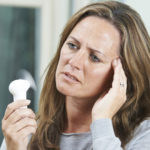Does Frequent Sex Delay Menopause?
I heard that the more often women have sex, the less likely they are to reach menopause early. If true, can you explain the connection?
Andrew Weil, M.D. | March 6, 2020

Your question relates to results of a study from the UK’s University College, London. It showed that menopause appears to occur earlier among women who have less active sex lives. This finding came from data on 2,936 women in the U.S. who were interviewed about their sexual history beginning when they were 45 years old and had not yet reached menopause. Most were married or in a relationship and living with their partner. All the women were asked how often they had engaged in sex in the previous six months and whether this involved sexual intercourse, oral sex, sexual touching or caressing, as well as whether they had engaged in self-stimulation. Most of the women reported engaging in weekly sexual activity. Among them 46 percent were starting to experience symptoms of menopause such as hot flashes or menstrual cycle changes. Another 54 percent had no menopausal symptoms.
Follow-up interviews were conducted over the course of 10 years, during which 45 percent of the women experienced natural menopause at the average age of 52. The researchers wrote that “it is often observed that married women have a later age of natural menopause than unmarried women” but “the reason for this association is unknown.” The study’s first author, Megan Arnot, said the new findings suggest that “if a woman is not having sex, and there is no chance of pregnancy, then the body ‘chooses’ not to invest in ovulation, as it would be pointless.”
The researchers also looked into the question of whether exposure to male pheromones among women living with a male partner affected the timing of menopause but found so such connection. One of the authors, noting that menopause is inevitable for women, made the point that no behavioral intervention can prevent a woman’s reproductive life from ending. She characterized the study’s findings as “an initial indication” that the timing of menopause may be an adaptive response to the likelihood of becoming pregnant – in other words, not having frequent sex may bring on menopause earlier. The study is the largest ever to look into how women’s sex lives affect the timing of menopause.
Most of the women in the study were non-Hispanic Caucasians, who on average had two children and were educated to above the level of high school. The researchers controlled for such factors as the women’s estrogen levels, education, body mass index, race, smoking habits, age at the onset of menstruation and overall health.
Andrew Weil, M.D.
Source:
Megan Arnot and Ruth Mace. “Sexual frequency is associated with age of natural menopause: results from the Study of Women’s Health Across the Nation.” Royal Society Open Science, January 14, 2020, DOI: 10.1098/rsos.191020












